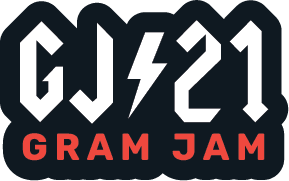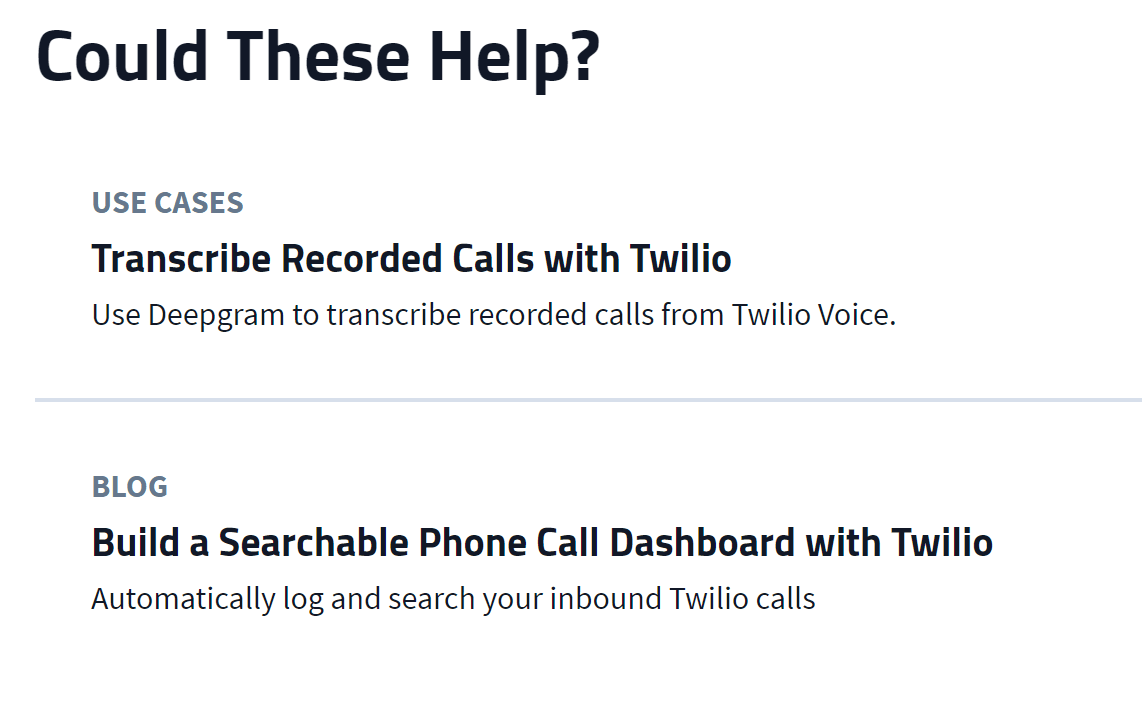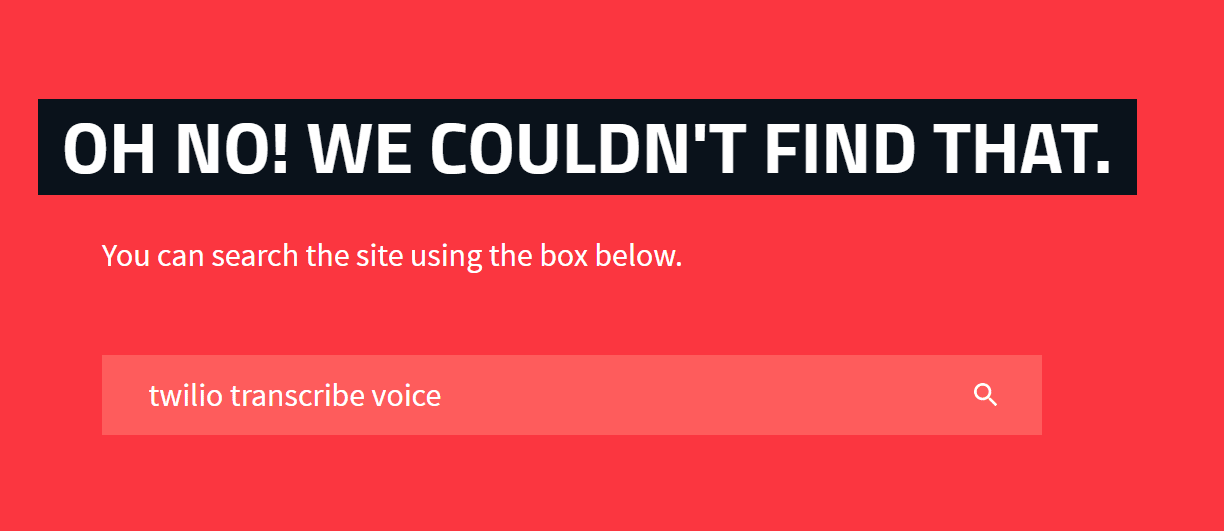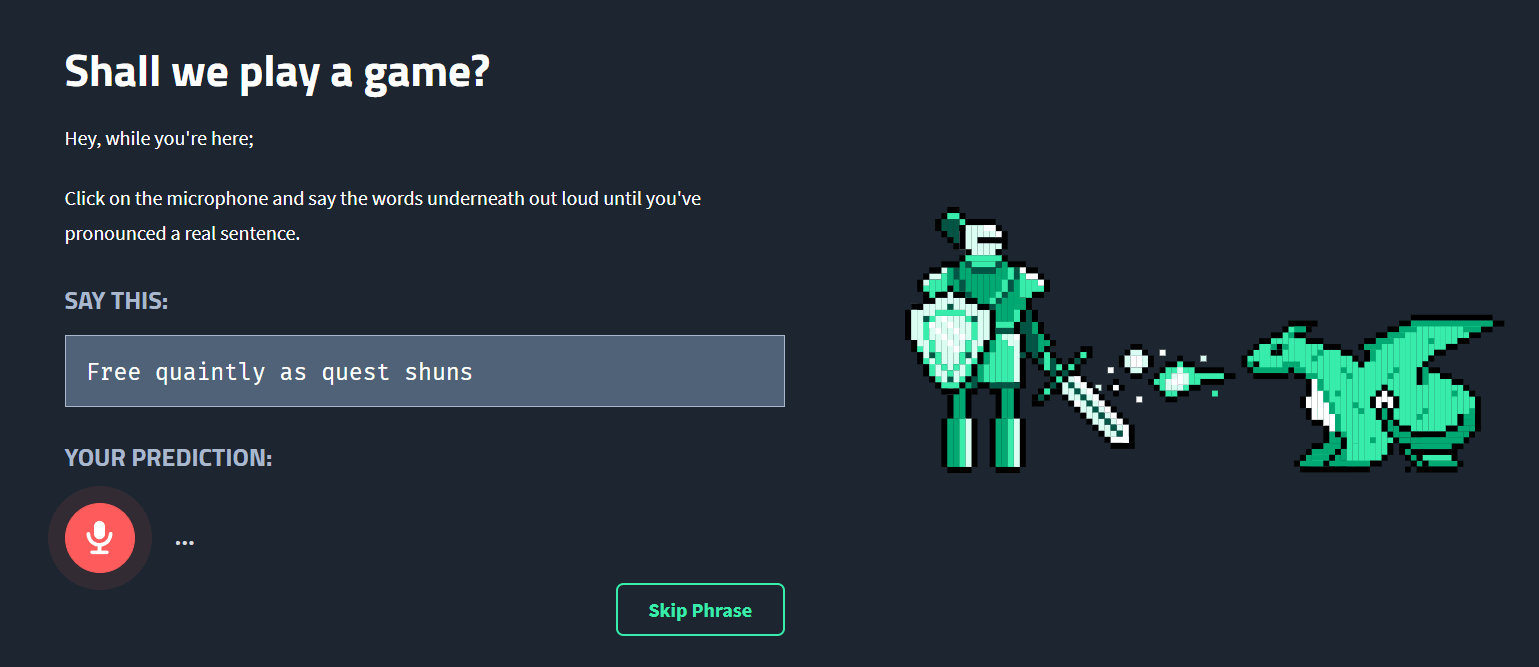Building 404 Pages That Bring Joy
You clicked on that link with high expectations. You knew you were about to find the answers you’d been searching for. Then it happened. You saw the dreaded 404 error letting you know that the content you were looking for wasn’t there. Maybe the content lives at a new location or perhaps it’s been permanently removed. Regardless of the reason, your high hopes have been dashed and you’re left to begin your search again.
It’s a terrible experience and one we wanted to make better. But before we get into the details of what we’ve done, let’s talk about where the idea started.
To Those About to Hack, We Salute You
At Deepgram, we have a goal that every interaction with us should be pleasant and (hopefully) enjoyable. We spend a lot of time thinking of how to make that happen. One of the methods we use for brainstorming ideas and gathering feedback is hosting internal hack-a-thons (known internally as GRAMJAMs.) Last year, 8 teams competed to be the GRAMJAM champion and one of the entries was a super fun game called MadGab.

The premise was simple: present the user with a nonsensical phrase that is phonetically similar to a real-life phrase. Players would read the nonsensical phrase aloud and attempt to then say the associated real-life phrase. An example would be “mass turk hard” in the place of “Mastercard.” It was a great experience. The game’s format was simple to understand and perform and it was highly addictive. We knew immediately that we had to make this available for others. This brings us back to the 404 page.
Making it Helpful
We knew we couldn’t just have a game on our 404 page. While it’s a fun distraction, we realized that the visitor came with a purpose. That purpose needed to be our number one priority. How could we help them reach their objective?
Can We Find What You’re Looking For?
Wouldn’t it be great if we could “guess” what you were looking for and provide you with a link to it? Fortunately, as we’ve built our site, we’ve tried to do a good job of creating routes that consist of keywords associated with the content of the page. This means we can assume that parsing a route (even one that resulted in a 404) should provide keywords that are relevant to what the user was trying to reach.
We then send those parsed words to Algolia to search our site and display the three most relevant results to the user. With a little luck, the results shown will provide the information the visitor was looking for and they’re only a click away from continuing their journey.

Quick Access to Search
What if there were no results or the results didn’t meet the user’s need. Without additional information, we can’t move the user forward. So we added a search input to the page to give quick access to finding what they’re looking for. Yes, we have a search bar on the top of every page in the navigation, but we don’t want users to expend unnecessary brain power trying to find it. Putting the search input front-and-center allows them to be on their way as efficiently as possible.

Now that we’ve done all we can to provide relevant information and paths forward, let’s try to brighten their day by providing a chance to have fun before they move on.
Making it Enjoyable
After some brainstorming, we had a list of requirements to recreate MadGab on our platform:
- Any API keys should remain on the server, or be short-lived (i.e. less than 5 minutes)
- Store the collection of gibberish phrases/answers on the server to protect them from cheaters 😁
We hope to open-source MadGab in the future, but, for now, I’ll share how we achieved the goals above.

Protecting API Keys
MadGab connects to the Deepgram API via a WebSocket and sends audio from the users’ microphone to be transcribed. This requires us to send an API key in the header of that connection. That means an API key will be exposed to the client. To minimize any risk, we wanted to use short-lived API keys. Because the developer platform is hosted on Netlify, functions seemed like a good option for providing a way to create a temporary API key to use for the game.
Luckily for us, the Deepgram API allows creating API keys with a specified time-to-live. So we imported the Deepgram Node SDK and use it to create a key that lives for 5 seconds. That’s just long enough for our front-end to connect to the Deepgram API before it expires. Below is the code for the Netlify function that generates and returns the API key.
const { Deepgram } = require('@deepgram/sdk')
require('dotenv').config()
const deepgram = new Deepgram(process.env.DEEPGRAM_API_KEY)
const deepgramProjectId = process.env.DEEPGRAM_PROJECT_ID
exports.handler = async function (event, context) {
try {
const key = await deepgram.keys.create(
deepgramProjectId,
'Temp 404 key',
['member'],
{
timeToLive: 5,
}
)
return {
statusCode: 200,
body: JSON.stringify(key),
}
} catch (err) {
console.log(err)
return {
statusCode: 500,
}
}
}No Peeking at the Answers
Our teams at Deepgram had already collected a list of phonetic phrases matched with the actual word phrases, so we were able to use that list in the game. While we could have created an array of those phrases in our component, we didn’t want users to be able to find them in the code and cheat. To solve this, we created another Netlify function that could be called to return phrases on-demand.
Each phrase is defined as an object with three properties:
id: a unique identifying number for the phrasesuggestion: the phonetic phraseresult: the phrase to be spoken
To prevent the need to call the function after every round of the game, the
function returns up to three phrase objects at a time. However, we don’t want to
send the same phrase to the same user until they’ve played every phrase
available. This requires us to track which phrases the user has played on the
client side. Then, each time we request new phrases, we’ll send an array of the
ID’s of each phrase the user has played in the body of the request. So the first
thing the function should do is ensure the request is sent via HTTP POST.
// Only allow POST
if (event.httpMethod !== 'POST') {
return {
statusCode: 405,
body: 'Method Not Allowed',
headers: {
Allow: 'Get',
},
}
}Next, it will parse the request body to get the id’s of the phrases the user has already attempted.
const userChoices = []
if (event.body !== undefined) {
const req = JSON.parse(event.body)
userChoices.push(...req.choices)
}Currently, our phrases are stored in an array inside the function and called
choices. So the next step is to filter the choices array to remove any
previously used phrases. If we’ve reached the end of choices, then we restart the
game and begin sending previously used phrases again. We’ll also set the
restart variable to true and return that as well. This notifies the
client-side that we’ve restarted and it should clear its cache of previously
used phrases.
let restart = false
const availableChoices = choices.filter((f) => !userChoices.includes(f.id))
if (availableChoices.length === 0) {
availableChoices.push(...choices)
restart = true
}Now we want to select three random choices from availableChoices. To do that,
we created a getRandomChoice function that can return a random phrase from
availableChoices.
function getRandomChoice(availableChoices) {
const randomNumber = Math.floor(Math.random() * availableChoices.length)
return availableChoices.splice(randomNumber, 1)[0]
}Then we can call that function three times to gather the three phrases to return to the client-side. If less than three phrases remain, we just return the remaining phrases.
if (availableChoices.length > 3) {
selectedChoices.push(getRandomChoice(availableChoices))
selectedChoices.push(getRandomChoice(availableChoices))
selectedChoices.push(getRandomChoice(availableChoices))
} else {
selectedChoices.push(...availableChoices)
}Finally, we return the selectedChoices array and the restart boolean to the
client-side.
return {
statusCode: 200,
body: JSON.stringify({
restart,
choices: selectedChoices,
}),
}Better Experiences are a Core Value
At the heart of this project is a desire to provide a better experience for developers. Our team at Deepgram spends a LOT of time focused on how to make that happen. From the experience of signing up, working in our console, using our SDKs, and yes, even our 404 page. We want every encounter with Deepgram to be informative, helpful, and pleasant. So while 404 pages interrupt your flow of work, hopefully, these changes empower you to find what you need faster, while also providing an enjoyable experience.